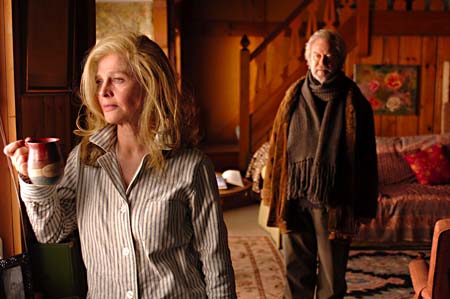 Sarah Polley seems an unlikely candidate for the direction of a film about old age. Having began her film career as a child television actor, the sprightly 28 year-old Canadian has spent the rest of it skipping through various acting instalments – most notably her touching portrayal of a mother dying from cancer in My Life Without Me. Stepping behind the camera for the first time, Polley tackles surprisingly similar themes in Away From Her, but this time her focus has skipped backwards a generation. The main characters are in their sixties, and this time Alzheimer’s is the destructive force slowly erasing its victim. After a 44-year marriage, Grant (Gordon Pinsent) has to cope with the gradual mental dissent and institutionalisation of his suffering wife, the eccentric and beautiful Fiona (Julie Christie).
Sarah Polley seems an unlikely candidate for the direction of a film about old age. Having began her film career as a child television actor, the sprightly 28 year-old Canadian has spent the rest of it skipping through various acting instalments – most notably her touching portrayal of a mother dying from cancer in My Life Without Me. Stepping behind the camera for the first time, Polley tackles surprisingly similar themes in Away From Her, but this time her focus has skipped backwards a generation. The main characters are in their sixties, and this time Alzheimer’s is the destructive force slowly erasing its victim. After a 44-year marriage, Grant (Gordon Pinsent) has to cope with the gradual mental dissent and institutionalisation of his suffering wife, the eccentric and beautiful Fiona (Julie Christie).Based upon the short story “The Bear Came Over the Mountain,” Away From Her sounds simplistic when described on paper – and to a certain extent this initial judgement remains correct. Yet, though the drama may remain relatively straight forward, Polley effectively steers it away from all expected clichés and potentially maudlin developments through a series of subversive narrative turns. What’s more, this uncluttered narrative has obviously allowed Polley room to move. She has unearthed a rich complexity from the space between the lines, inscribing a multi-layered complexity upon every pause in the script.
And, in the end, the strength of Away From Her lies not in its thought-provoking dialogue or in its richly crafted characters, but in its visual impact. In the way that Christie’s face flickers elusively between recognition and confusion. In the soft edged pastels of Grant’s flashbacks, toned with nostalgia and regret. In the heart wrenching devotion with which he observes his wife from afar. And in the palpable distance that slowly wedges itself between them, like an invisible current subtly pulling them apart. These are the images that will remain with you days after seeing the film, infused with a seemingly unaltered emotional impact. This is a rare gem of a film, but please remember to bring tissues with you. Trust me.
Rating: 9.4











